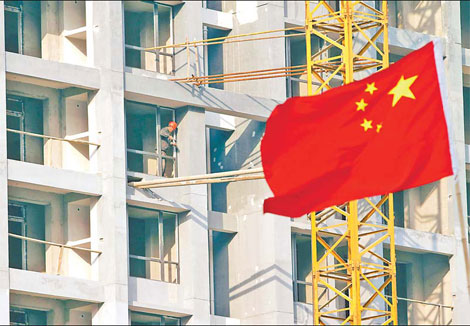-
News >Bizchina
Central bank pledges to intensify fight against inflation
2010-11-25 09:32BEIJING - China's central bank on Wednesday vowed to "steadily guide credit expansion back to normal levels" and strengthen liquidity management in an effort to curb inflation and cool rising inflation expectation.
The central bank will make full use of its policy tools, including the reserve requirement ratio and interest rate, to steer money and lending growth back to normal levels, said Hu Xiaolian, deputy governor of the People's Bank of China (PBOC), according to a statement posted on the central bank's website.
The State Council issued a circular last week introducing a slew of measures, including increasing supplies, to cool inflation.
"The key task of monetary policy currently is to strengthen liquidity management, which is also a main way of normalizing monetary conditions," Hu said.
"Continuous money inflows, as a result of stronger expectation of yuan appreciation, are pushing up goods and asset prices and adding more difficulty to liquidity management," she added.
Hu admitted that the monetary authority is facing a challenge in keeping new loans within the 7.5 trillion yuan ($1.13 trillion) target it set at the beginning of the year, as lending expansion rebounded in recent months due to robust credit demand.
She said domestic lenders should take substantive measures to control the pace of credit growth for the rest of the year and continue to carry out differential mortgage loan policies for second and third home buyers.
Chinese banks extended 6.88 trillion yuan in new loans in the first 10 months of this year, accounting for 90 percent of the country's annual lending target even though there is still more than a month left of 2010.
"Tackling inflation will be an overarching policy priority - the lagging effect of massive monetary expansion in 2009 and 2010 will continue to provide strong tailwinds for inflation in the near term," Wang Qing, chief China economist at Morgan Stanley Asia said in a research note.
The central bank in October raised interest rates for the first time since 2007, a signal that the authority is returning to a "normalized" monetary policy as excessive liquidity fuels price risks. Since then it has twice asked banks to set aside more deposits as reserves to limit their capacity to lend.
"Rate hikes and liquidity management can and need to play a critical role to control inflation expectations and prevent food inflation from spreading to the general economy," Wang Tao, chief China economist at UBS Securities, said. She expects another interest rate hike before the end of the year.
Economists said fighting inflation is likely to become a top government priority next year, and the market is waiting to see what the policy tone will be at the upcoming economic work conference of the Party's central committee.
Policymakers will fine-tune the fiscal and monetary policy next year, if they are assured of the country's economic growth momentum, Cao Yuanzheng, chief economist at Bank of China International, said.





